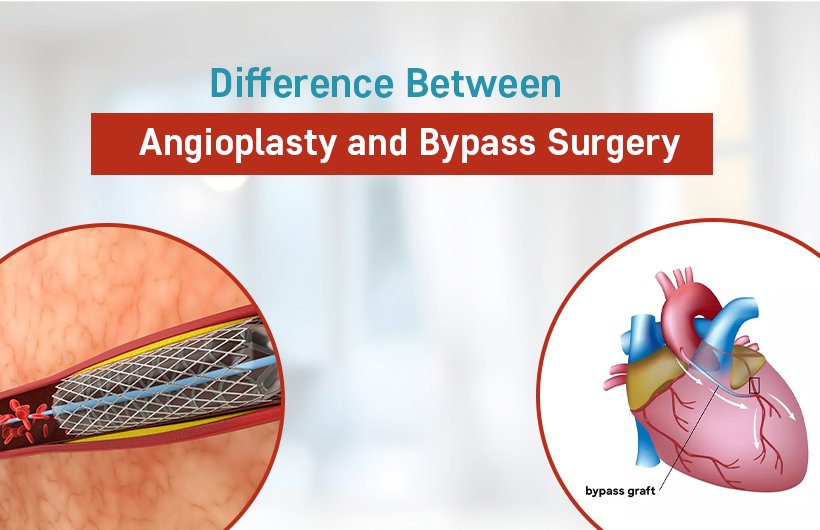When you hear terms like angioplasty or bypass surgery, it is natural to feel confused or even worried. Both treatments are used for heart blockage, but they work in different ways. Understanding the difference helps you make better decisions for your health. This blog explains everything in simple language so you can easily know what each procedure means and when it is recommended. If you are searching for the right guidance, a Heart Specialist doctor in Ahmedabad, like Dr Jignesh Patel, can help you choose the safest and most effective treatment.
What Is the Main Difference Between Angioplasty and Bypass Surgery?
Both angioplasty and bypass surgery treat blocked or narrowed coronary arteries, but they do it in different ways.
Angioplasty
Angioplasty is a minimally invasive procedure used to open blocked heart arteries. During angioplasty, a thin tube called a catheter is inserted through the wrist or groin and guided up to the blocked artery. A small balloon is then inflated to widen the artery, and in most cases, a stent (a tiny metal mesh) is placed to keep the artery open.
Key points about angioplasty:
- It is less invasive.
- Recovery time is short.
- Usually requires only 1–2 days of hospital stay.
- Suitable when blockages are fewer and located in specific areas.
- Preferred for emergency heart attack treatment.
Many people prefer angioplasty because the procedure is quick and does not involve major surgery. For those looking for angioplasty treatment in Ahmedabad, experienced doctors like Dr Jignesh Patel offer advanced and safe care.
Bypass Surgery
Bypass surgery (CABG – Coronary Artery Bypass Grafting) is a major heart surgery. In this procedure, the surgeon creates a new route (bypass) for blood to flow around the blocked artery. Blood vessels from the leg, arm, or chest are used to make this new pathway.
Key points about bypass surgery:
- It is an open-heart surgery.
- Requires longer recovery time.
- Recommended for patients with multiple blockages.
- Offers long-term relief from symptoms.
- More suitable for severe or complex heart disease.
Bypass surgery is often chosen when angioplasty cannot provide long-term results, especially in cases where arteries are heavily blocked or have difficult-to-treat plaque.
How Does the Doctor Decide Between Angioplasty vs Bypass Surgery?
Choosing the right treatment is not the same for everyone. Several factors help the doctor decide whether angioplasty or bypass surgery is better for you. A cardiologist near you will evaluate your complete health before recommending the best option.
1. Number and Location of Blockages
- If there is one major blockage, angioplasty is usually enough.
- If there are multiple blockages, especially in important arteries, bypass surgery may be safer.
- Blockages in smaller or harder-to-reach arteries often respond better to surgery.
2. Severity of the Blockage
Severe blockages with heavy calcium deposits may not open fully with a stent. Such cases are more suitable for bypass surgery.
3. Heart Function
Doctors check how well the heart is pumping. If your heart function is weak, bypass surgery may improve blood flow more effectively.
4. Other Medical Conditions
Patients with diabetes, kidney problems, or previous stents often benefit more from bypass surgery because it gives longer-term protection.
5. Age and Lifestyle
Younger patients may prefer angioplasty because it has a quicker recovery. Older patients or those with high surgical risk may also be advised to undergo angioplasty.
6. Emergency Situations
During a heart attack, angioplasty is almost always the first choice because it can quickly open the blocked artery and save heart muscle.
Experienced cardiologists like Dr Jignesh Patel assess all these points carefully before recommending the best heart blockage treatment. His expertise ensures that patients receive the safest treatment for their specific condition.
Which Treatment Is Better for Heart Blockage?
There is no single treatment that is best for everyone. The right option depends on your medical condition.
Angioplasty May Be Better If:
- You have mild or moderate blockages.
- Only 1–2 arteries are blocked.
- You want a shorter recovery time.
- You need emergency treatment during a heart attack.
Bypass Surgery May Be Better If:
- You have 3 or more blocked arteries.
- The blockage is in the left main artery.
- You have diabetes or other health complications.
- You need a long-term solution with fewer chances of repeat blockages.
Effectiveness and Long-Term Results
- Angioplasty gives quick relief but may need repeat procedures if new blockages form.
- Bypass surgery offers long-lasting results and is often recommended for severe diseases.
The decision is always made after checking your test reports, angiography results, overall health, and future risk.
Conclusion
Understanding the difference between angioplasty and bypass surgery helps you make confident decisions about your heart health. Both treatments are effective, but they work differently and are used for different types of blockages. Always discuss your condition openly with a Heart Specialist doctor who can guide you with the right advice.
If you want expert care and clear guidance, consulting an experienced cardiologist in Ahmedabad, like Dr Jignesh Patel, can make the treatment journey smoother and safer. Remember, early diagnosis and timely treatment can protect your heart and improve your overall quality of life.
If you ever notice symptoms like chest pain, breathlessness, fatigue, or sudden weakness, don’t ignore them. Seek medical attention immediately and choose the right heart blockage treatment with the help of your doctor.






